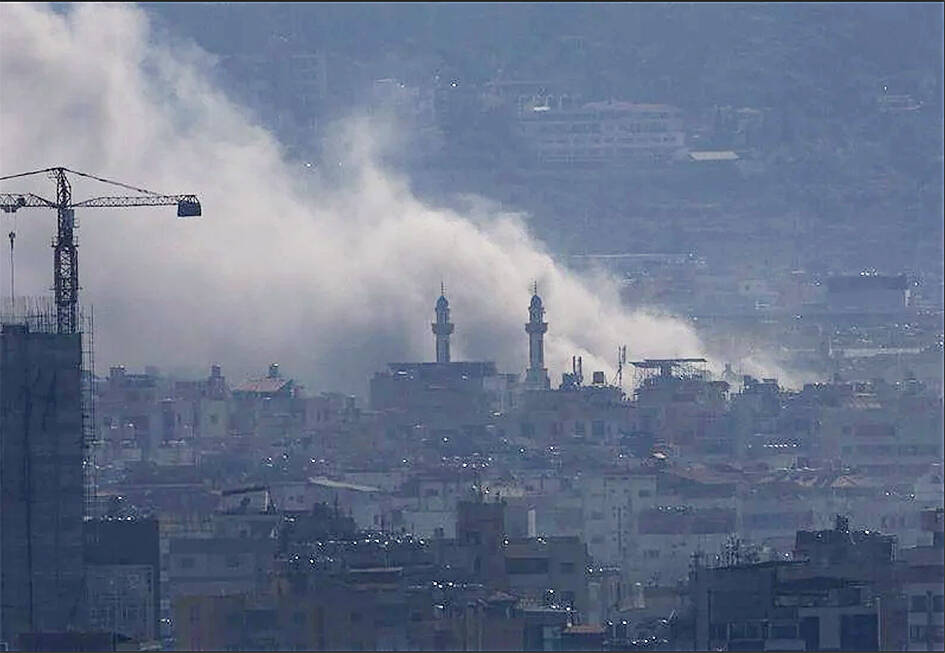Israel and Lebanon’s Hezbollah traded deadly blows yesterday as their war raged on, despite signs of progress in US ceasefire efforts, with airstrikes pounding Beirut’s southern suburbs and rockets flying into northern Israel.
US mediator Amos Hochstein was in Israel for talks with Israeli officials to try to secure a ceasefire, which he said was “within our grasp” during a visit to Beirut earlier this week.
The diplomacy marks the most serious attempt yet to end the conflict between Israel and the heavily armed, Iran-backed Hezbollah, part of the regional spillover of the Gaza war that erupted more than a year ago.

Photo: Reuters
In southern Lebanon, an Israeli airstrike killed three people in the village of Chaaitiyeh, about 10km from the border, the Lebanese Ministry of Health said.
In Israel, a 30-year-old man was killed when shrapnel from a rocket struck a playground in the northern town of Nahariya, Israel’s Magen David Adom medical service said.
“The Israeli government is not safeguarding my security, my residents or the residents of the north [of Israel]. It is not possible to live in such a situation like this,” Nahariya Mayor Ronen Marelly told public broadcaster Kan.
The Israeli military said about 10 rockets were launched from Lebanon toward Nahariya.
“Most of the projectiles were intercepted and fallen projectiles were identified,” the military said in a statement.
Channel 12 said three rockets hit the coastal town.
White House envoy Hochstein left for Israel after declaring progress during two days of talks in Lebanon with officials including Lebanese Parliament Speaker Nabih Berri, endorsed to negotiate by the Iran-backed Hezbollah.
Speaking before he left Beirut, Hochstein said he was going to Israel to try to close an agreement if possible.

US President Donald Trump yesterday announced sweeping "reciprocal tariffs" on US trading partners, including a 32 percent tax on goods from Taiwan that is set to take effect on Wednesday. At a Rose Garden event, Trump declared a 10 percent baseline tax on imports from all countries, with the White House saying it would take effect on Saturday. Countries with larger trade surpluses with the US would face higher duties beginning on Wednesday, including Taiwan (32 percent), China (34 percent), Japan (24 percent), South Korea (25 percent), Vietnam (46 percent) and Thailand (36 percent). Canada and Mexico, the two largest US trading

ACTION PLAN: Taiwan would expand procurement from the US and encourage more companies to invest in the US to deepen bilateral cooperation, Lai said The government would not impose reciprocal tariffs in retaliation against US levies, President William Lai (賴清德) said yesterday, as he announced five strategies to address the issue, including pledging to increase Taiwanese companies’ investments in the US. Lai has in the past few days met with administrative and national security officials, as well as representatives from various industries, to explore countermeasures after US President Donald Trump on Wednesday last week announced a 32 percent duty on Taiwanese imports. In a video released yesterday evening, Lai said that Taiwan would not retaliate against the US with higher tariffs and Taiwanese companies’ commitments to

‘SPECIAL CHANNEL’: Taipei’s most important tasks are to stabilize industries affected by Trump’s trade tariffs and keep negotiations with Washington open, a source said National Security Council Secretary-General Joseph Wu (吳釗燮) arrived in the US for talks with US President Donald Trump’s administration, a source familiar with the matter said on Friday. Wu was leading a delegation for a meeting known as the “special channel,” the Financial Times reported earlier. It marked Trump’s first use of the channel since returning to the White House on Jan. 20. Citing a source familiar with the matter, the Financial Times reported that Minister of Foreign Affairs Lin Chia-lung (林佳龍) was also a part of the delegation. The visit came days after China concluded war games around Taiwan and amid Trump’s

CHIP EXCEPTION: An official said that an exception for Taiwanese semiconductors would have a limited effect, as most are packaged in third nations before being sold The Executive Yuan yesterday decried US President Donald Trump’s 32 percent tariff on Taiwanese goods announced hours earlier as “unfair,” saying it would lodge a representation with Washington. The Cabinet in a statement described the pledged US tariffs, expected to take effect on Wednesday next week, as “deeply unreasonable” and “highly regrettable.” Cabinet spokeswoman Michelle Lee (李慧芝) said that the government would “lodge a solemn representation” with the US Trade Representative and continue negotiating with Washington to “ensure the interests of our nation and industries.” Trump at a news conference in Washington on Wednesday announced a 10 percent baseline tariff on most goods